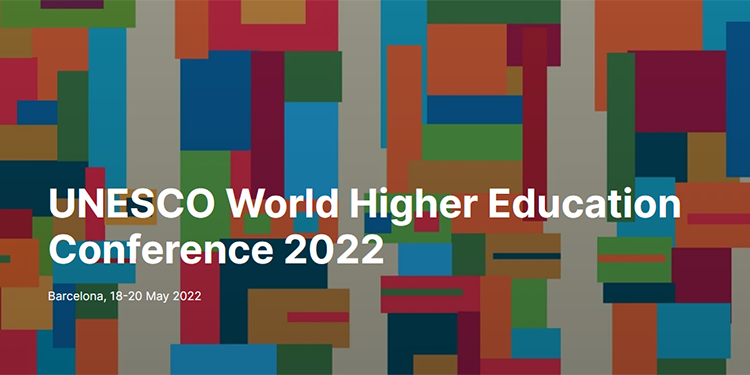After 120 roundtable sessions, 86 ‘HED’ talks and five youth-led activities, the UNESCO World Higher Education Conference 2022 concluded on Friday 20 May in Barcelona, Spain, with the announcement of a common ‘Roadmap to 2030’ and a demand that barriers to change be “blown down now”.
UNESCO Assistant Director-General for Education Stefania Giannini described the roadmap as being “about next steps for the future and the vision we are bringing”. But it came with a number of caveats.
“It is a working, living document; it is not a negotiated outcome document. This is not an intergovernmental process,” she explained.
So rather than being an action plan agreed by governments, it represents a synthesis of the agreed priorities to guide future development of higher education.
They have been drawn up after two years of extensive consultations, the production of 10 reports by technical expert groups – and three days of discussion at the world conference and they may evolve further in coming months during a second phase of consultation.
“This World Higher Education Conference was about provoking a debate globally and bringing all the perspectives to build a new vision, a new phase for higher education and universities to be at the core of a new more sustainable, peaceful world,” Giannini said.
Crucial shifts were needed to focus on “cooperation over competition, diversity over uniformity and flexible learning over traditionally well-structured, hierarchical models of education”, she added.
But openness was critical too. “You need an open system of higher education to build bridges and promote partnerships around the world.”
Also, the roadmap was not just about achieving the internationally agreed 2030 Agenda and its 17 Sustainable Development Goals (SDGs) and 169 targets, designed to protect the planet and build peace and prosperity, but also more ambitiously, looking ahead to 2050 and “going very much beyond the focus of discussions over last few years”.
Throughout the process the following six principles – the Roadmap to 2030 – should be followed:
- Greater inclusion and promoting diversity.
- Academic freedom balanced by public accountability.
- Inquiry, critical thinking and creativity, unlocking the potential of every kind of science literacy.
- Integrity and ethics, “generating a new kind of citizenship” for the future.
- A commitment to sustainability and social responsibility, having a dynamic relationship with the community.
- Cooperation for excellence rather than competition.
Higher education, training, research and social engagement needed to be shaped by three missions.
First, educating citizens for this century means ensuring they are able to negotiate complexity – “one of the most difficult and main missions of higher education today”.
Second, there is a need for a holistic approach and humanistic approach. Following complexity requires knowledge to be produced through transdisciplinarity, not simply putting together different competences as interdisciplinarity requires, and it entails connecting the sciences and humanities.
Third, it is about social engagement and ethical responsibility.
“For sure it is a very ambitious roadmap, but it is not something being concluded here in Barcelona. The conference is the beginning of the process.”
In 2027 a Barcelona+5 session will reflect on what has been implemented from the roadmap.
The Roadmap to 2030 is backed up by and informed by a wealth of research into 10 themes, produced by technical expert groups, including the report by the UNESCO Global Independent Expert Group on the Universities and the 2030 Agenda entitled: Knowledge-driven Actions: Transforming higher education for global sustainability; and Reimagining the Futures of Higher Education: Insights from a scenario development process towards 2050.
The former constitutes an urgent call for universities to play a much stronger role in the societal transformation needed to achieve the SDGs and in solving some of the world’s greatest problems.
It also urges higher education institutions to embrace the 2030 Agenda by making sustainability and SDG literacy a core requisite for all faculty members and students, to connect students with real world problems and to foster immersive experiences.
The Reimagining the Futures of Higher Education report envisaged four desirable scenarios for higher education towards 2050, using the common good as the visionary lens and social justice as the framework to support the idea of accessible, inclusive and equitable higher education systems.
These scenarios are:
- Open education
- Technology-enabled networked learning hubs
- Ecologically sustainable higher education
- Development-driven higher education.
Source: https://www.universityworldnews.com/post.php?story=20220525095453173

